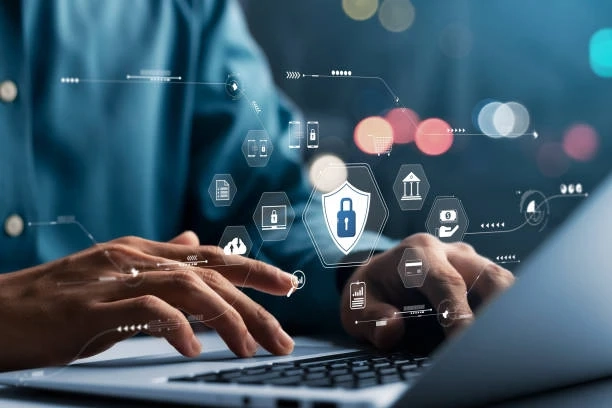5G has transformed the way we connect with people across the globe. It has also shaped content consumption trends and enhanced the use of iOS devices. 5G has given us faster internet speeds, lower latency, and the ability to support a range of different devices.
While 5G has laid the foundation of several smart cities, it has also invited various cybersecurity challenges.
Let us dive a little deeper into the impact of 5G on cybersecurity services and the opportunities we have to improve our organizations’ security posture.
What Makes 5G Different?
Before discussing the major 5G cybersecurity challenges and opportunities, let us quickly understand how 5G is different from its predecessors:
High Speed, Low Latency
5G networks offer unmatched speed to users of all digital devices. These speeds go up to five times as fast as 4G devices. 5G also gives you ultra-low latency, significantly improving user experiences across the board. Low latency has made the technology especially useful in applications like vehicle-to-vehicle communication, remote surgery, and more across multiple industries.
Device Connectivity
5G facilitates seamless connectivity for up to one million devices per square kilometer. This makes it the go-to technology for smart cities and cities with multiple IoT devices.
Decentralized Infrastructure
The foundation of 5G lies in a decentralized and software-driven architecture. This makes it more flexible than 4G. However, such an architecture also gives cyber attackers more entry points.
Cybersecurity Challenges Of 5G
Cybersecurity and 5G share a love-hate relationship! While it can make your cybersecurity solutions faster and more effective, it can also increase your infrastructure’s vulnerability to cyberattacks.
If you want to make the most of 5G while securing your digital assets, work with the best cyber security service providers around you. Focus on the local experts who understand the latest trends. For example, if you run an organization in Pune, look for the most reliable cyber security services in Pune to keep your digital environment safe.
Let us now get to the major cybersecurity challenges 5G poses:
Wider Attack Surface
5G has allowed billions of devices worldwide to connect to the internet. This significantly increases the number of vulnerabilities for organizations and individuals.
For example, IoT devices with poor built-in security are at a high risk of cyberattacks. Attackers may also target smart sensors in homes, offices, and public places.
While 5G gives you multiple endpoints, every endpoint can become a target for attackers. Such a situation increases the risk of data theft, network breaches, service disruption, and more.
Network Slicing Complications
5G lets service providers create different virtual networks using a single physical infrastructure. This is called network slicing. While this has proved to be efficient over time, it may lead to various complications.
If there is no proper isolation, a breach in one network slice can compromise the security of all other slices using the same infrastructure. Moreover, misconfigurations in software-defined components could risk sensitive services.
Such 5G cybersecurity challenges can be tackled with airtight segmentation and powerful authentication across network slices.
Supply Chain Attacks
Supply chain or vendor attacks have become even more common after the introduction of 5G. 5G networks involve many hardware suppliers and vendors, increasing security risks across the board.
For example, 5G devices and users may be at risk of embedded malware and backdoors in foreign-made components. There may also be a lack of transparency in proprietary technologies used by network vendors.
Inconsistent global security standards raise concerns about the vulnerabilities in international 5G deployments. The fear of supply chain attacks has also made some countries ban specific equipment manufacturers.
Sophisticated Threat Actors
The rise of 5G has made threat actors more sophisticated. The critical use of the network in sensitive sectors like healthcare, defense, and finance further raises cybersecurity concerns.
Such widespread use and application of 5G increases the risk of state-sponsored cyberattacks. Such attacks can disrupt national security in no time.
5G can also motivate organized cybercrime groups to exploit vulnerabilities in industries like healthcare, defense, finance, IT, and more. New-age attackers are also leveraging technologies like AI to worsen attacks using 5G.
Cybersecurity Opportunities With 5G
The combination of cybersecurity and 5G is not always risky. It also helps organizations and individuals enhance security measures using the high-end network.
Here are a few major cybersecurity opportunities the world of 5G offers:
Improved Threat Detection
Combined with AI and edge computing, 5G has made thread detection faster and more specific. High speed and ultra-low latency allow modern cybersecurity tools to detect and remediate threats in real-time.
Thanks to the versatility of 5G, organizations of all scales can now detect anomalies and identify unusual behavior patterns.
Improved Network Configurations
Unlike 4G, 5G has led to more dynamic and programmable network configurations. These configurations let organizations easily implement a zero-trust architecture that trusts no authority across the board.
Enhanced network configurations also let organizations enforce end-to-end encryption and dynamic access for a better security posture.
Better Identity Access Management
Identity access management (IAM) ensures that the right people have access to the right digital resources in an organization. Widespread application of 5G gives organizations granular control over who has access to which resources from which device.
Along with incorporating a zero-trust architecture, 5G improved IAM with a better implementation of multi-factor authentication, biometrics, and other secure ways to access valuable resources.
The Final Word
The advent of 5G has brought both cybersecurity challenges and opportunities. Organizations should prepare for the challenges while making the most of the available opportunities.
Especially if you work in sectors dealing with sensitive data, consult reputed cybersecurity service providers to leverage 5G for your organization’s security posture. These professionals will analyze your existing IT infrastructure and provide personalized strategies to keep your digital assets secure.

